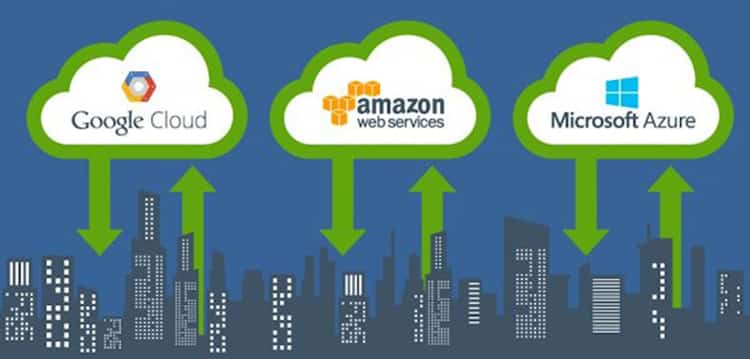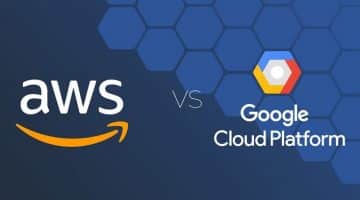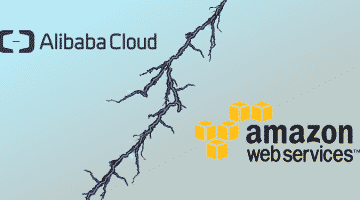Why the Cloud services?
Many brands in public, and private sectors like Netflix, Spotify, Expedia, PBS, and much more rely on cloud services for supporting their online operations. If they had to implement the physical infrastructure they need for their operations themselves, they would need complete infrastructure team of their own, lots of extra budget and time. A cloud computing platform and some outsourced freelance work can quickly get you online!
Introduction to AWS, Azure, and GCE:
Amazon Web Services were launched in 2006. The AWS being the first one, has got some advantages over the other platforms. As the services are continuously improved over the years, the platform now has more than 70 services with a wide range of coverage. AWS is reporting 31% market share in the second quarter of 2016.
Microsoft Azure is in the market since 2010. It is a complex system providing support for many different services, programming languages, and frameworks. Azure holds 11% of the market as of Q2 2016.
Google Cloud Platform was introduced in 2011. It is the youngest cloud platform. It is designed to meet the needs of Google Search and YouTube. Google still has only 5% of market share and as of Q2 2016.
Comparison between three Cloud Platforms on Specific Parameters:
Compute
Computing is a fundamental process for your business. The advantage of cloud computing is that you have a powerful and expandable computing infrastructure available for you as and when you need it. You can hire freelancers for working on the cloud and won’t need any infrastructure team as well.
The key AWS computing service is Elastic Compute Cloud (EC2). Based on the industry, additions such as AWS Elastic Beanstalk or EC2 Container Services can significantly reduce your costs. At the moment, AWS offers regional support as well as zone support.
The heart of Microsoft Azure computing is Virtual Machines and Virtual Machine Scale Sets. Windows client apps get deployed with the RemoteApp service.
In 2012, Google introduced their cloud services by name Google Compute Engine (GCE). This Engine lets users launch virtual machines similar to AWS. A powerful computing platform which is still developing and getting adapted.
Analytics
In the field of data analytics, AWS has entered into a big data and machine learning. If you don’t need extensive data analysis, you can use the Quick Sight service. This service will help you discover patterns and make conclusions from the received data.
Microsoft Azure has taken steps toward big data and machine learning, but they don’t have a specific offering in these areas.
Google Cloud has the most advanced offering for big data analysis, machine learning, and artificial intelligence.
Data Storage
Data storage is an extremely important part of cloud computing because it enables you to allocate all sorts of information in an online location.
The AWS Simple Storage Service (S3) is an industry standard service. You can find a wealth of documentation, case studies, sample codes, libraries, as well as forum discussions where AWS engineers participate.
Azure and Google Cloud Platform both have reliable and robust storage. Compared to both of them, AWS is very powerful in the documentation and information. They have working and archive storage and different additional services, but they can’t out-perform AWS.
Network
It may come in handy to have your network in the cloud. You can have separate VPN for your project team only. It’s a great feature which adds value to your cloud system due to another layer of data security and privacy.
For AWS, you can use the Virtual Private Cloud to create your VPN and set your network topology, create subnets, route tables, even private IP address ranges, and network gateways.
Microsoft Azure has a solid private networking concept. The Virtual Network allows you to set your VPN, have public IP if you want, and use a hybrid cloud, DNS or a firewall.
Google Cloud Platform’s offering is not as extensive yet. It has the Cloud Virtual Network and supports Public IP, firewall, and DNS.
Cloud Security
Amazon assures users to have increased security and more controls at the lower cost. Main benefits of AWS are:
- Keep All Your Data Safe
- Quick Application/Solution Scalability
- Meet Compliance Requirements
- Save Costs
Microsoft Azure cloud security has five layers viz. data, application, host, network, and physical. Microsoft offers services such as:
- Controlling and managing user access and identity
- Encrypting operation and communication process
- Managing Threats and Securing Networks
Google Cloud security features are:
- Google data centers feature a layered security model
- Google runs tens of thousands of identical, custom-built servers. They built everything from hardware and networking to the OS with security in mind.
- They have controls and practices to protect the security of customer information.
- When a client leaves the Google’s systems, hard disks containing customer information go through a data destruction process.
Pricing
At the end of the day, everyone wants to know the cost of these services. The prices for each provider are according to your needs and requirements.
AWS uses three payment models:
- On demand: Pay only for resources and services you use
- Reserve: Select the resources that you want to book upfront for 1 to 3 years and pay based on utilisation
- Spot: You can take advantage of unused capacity and bid with others for additional space
Azure pricing is a bit flexible and charges per minute, by rounding per commitments. Their pricing models aren’t as flexible compared to other platforms.
GCP pricing is similar to Azure and charge per minute is applicable here also. The GCP also offers sustained use discounting, which means that you will get a discount for regular usage.
Summary:
If you have a lot of cloud knowledge in-house, no public cloud can compare to the offerings of AWS. If you are looking for PaaS, and you’re already using many Microsoft services, go with Azure. If you’re a major data analyser, Google’s data storage and analytics tools are great for your task. The AWS tops the networking category because it has the most reliable DNS provider.
- Top 6 SEO Tools to Boost Your Business - January 18, 2024
- Top PHP interview questions and answers 2020 - July 7, 2020
- How to create a Whatsapp account using the Australian number? - June 28, 2020




